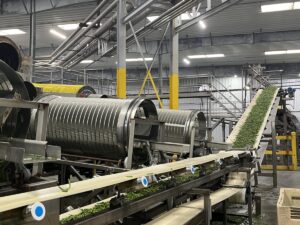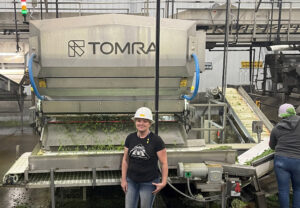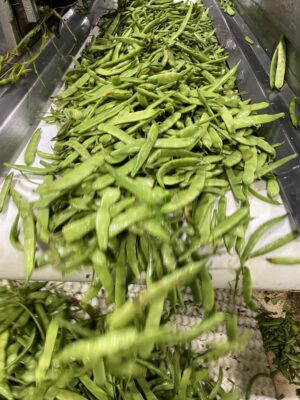Sorting solutions: Equipment advances fuel growth of canning operation
Amanda Salisbury loves sorters. In fact, she loves them with an unabashed affection that guided her career path.
Salisbury, maintenance superintendent at McCall Farms in Effingham, South Carolina, became intrigued with TOMRA Food’s sorting technology as she was graduating from Sierra College in California.
“I actually chose TOMRA specifically because of the sorter machine,” said Salisbury, who worked for the Belgium- based company for three years. “I looked up their technology, I looked at those machines, and I said, ‘I want to know more about that.’ … I still love the sorters to this day. I’m always learning something new.”

Founded in 1838, McCall Farms has grown into a one million-square-foot canning operation growing crops on 2,000 acres, with nine national brands and 235 products. The farm works with other South Carolina growers, as well as farms in North Carolina, Georgia and Florida, on an additional 25,000 contracted acres of crops including green beans, tomatoes, cabbage, greens, corn, sweet potatoes and peanuts.
The TOMRA technology that so appealed to a newly graduated Salisbury has fueled the farm’s growth.
TECHNOLOGICAL LEAP
In the years leading up to and including 2018, McCall Farms typically produced 18 million cans of green beans per year. By 2022, that number ballooned to 204 million cans per year, largely because of the company’s acquisition of a state-of-the-art TOMRA 5B optical sorting machine.
McCall Farms embarked on a $35 million expansion in 2017 and invested another $50 million in a 2019 expansion. Those moves created hundreds of jobs and represent the in-state investment the South Carolina Department of Agriculture wants to encourage through a new $40 million incentive program funded by the state’s General Assembly.
McCall Farms, in its sixth generation of family ownership, employs more than 1,000 people, but difficulties in recruitment and retention, paired with growing production needs, left the farm searching for new solutions.

“We sold more beans, we were canning more beans,” Salisbury said. “We couldn’t keep up with quality to the standard that we felt we needed to.”
McCall Farms already used TOMRA Sentinel II optical sorting machines, cost- efficient equipment that works product at rates between 400-200 tons per hour. The farm decided to invest in the TOMRA 5B, with an on-belt inspection zone and 360° view, along with the ability to capture and store images of foreign materials for easy alerts.
The machine, which can sort by shape, size and length-to-width ratio using advanced sensor technology and shape algorithms, has improved the quality of McCall Farms products while reducing dependence on manual labor, Salisbury said.
“The sorter didn’t give us what we wanted; it gave us better than what we wanted,” she said. “Being able to have a machine that can control everything and work at speeds that no human would work at … it’s huge. What we’ve been able to accomplish is just phenomenal.”
Parker Fales, area sales manager for TOMRA Food, takes satisfaction in seeing how the company’s equipment has helped McCall Farms boost production.
“It’s really shot through the roof,” Fales told Produce Processing during a recent visit to McCall Farms. “We’ve been able to run additional product through our equipment with higher yields, more efficiencies, and get more product out the door to McCall Farms’ customers.”
GROWING OPERATIONS
The continued growth of South Carolina agribusinesses such as McCall Farms is a goal of a newly announced state incentive program. The $40 million Growing Agribusiness Fund, launched in August, aims to buoy businesses engaged in the processing, packaging, manufacturing, distribution, storage and transportation of agricultural products.
A 2022 study by Joey Von Nessen, research economist for the University of South Carolina’s Darla Moore School of Business, found that South Carolina currently imports $11.7 billion in agribusiness products from outside the state. Bringing that demand in- state would increase the total value of agribusiness, which had a $51.8 billion economic impact on the state in 2022, by 23%, according to the study.

Those numbers, along with the supply chain disruptions encountered by in- state producers during the COVID-19 pandemic, led to initial conversations with 40-50 companies about ways to keep more aspects of production closer to home, said Clint Leach, assistant commissioner for the South Carolina Department of Agriculture.
“Our state has incentive programs to help companies expand their operations,” Leach said. “We wanted to make sure that the companies in the agribusiness space had the opportunity that is afforded to other companies coming in or expanding.”
Agribusinesses that are considering expanding and investing at least $3 million in their current location or establishing an additional location in the state are encouraged to contact the agricultural department to discuss their project. Operations located in Tier 3 and 4 counties (those designated by the South Carolina Department of Revenue as having higher unemployment and lower income) are highly encouraged to apply.
“That’s predominantly where farms are,” Leach said. “So the idea was to use this program to bootstrap up the counties who are most in need of growth.”
Leach said early response to the program has been “overwhelming, in a positive way.” Examples of potential projects could include a second facility for an existing packaging operation to start a new line or additional equipment to increase production capacity at a vegetable canning operation.
The goal, Leach said, goes beyond the bottom line.
“The great thing about the expansions, beyond the new jobs and the capital investment that’s made in the local community, is every time that they expand, they have to source more acreage, which gives local farmers another shot,” he said.







